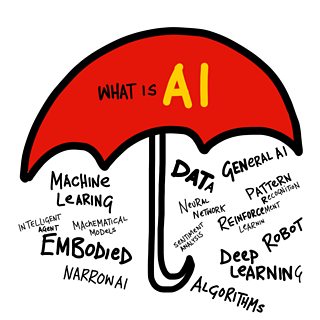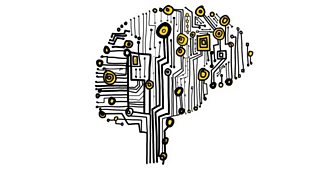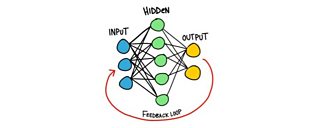Why should I care about artificial intelligence?
Ali Shah
Emerging Technology and Strategic Direction
From the realms of science fiction to mainstream proposition, Artificial Intelligence continues to develop at speed. Ali Shah is Head of Emerging Technology and Strategic Direction and explains how the 主播大秀 is approaching AI and what opportunities - and risks - it can offer.
My name is Ali and it is my job to identify developments in technology that will impact the 主播大秀 and society at large, and to then develop a plan for how we respond to these developments to improve the services the 主播大秀 provides.
At the moment, a lot of my time is being spent helping the 主播大秀 to understand the implications of the latest developments in artificial intelligence and developing the 主播大秀’s artificial intelligence capabilities.
Before I dive into why the 主播大秀 cares about artificial intelligence, I think it might be useful to spend a little bit of time explaining what I mean the term, and why that’s a hard thing to do.

The problem with trying to explain artificial intelligence is that there is no one definition. Trying to wordsmith the definition and getting everyone to agree to it is difficult, and perhaps isn’t really necessary. What is important however is knowing the context when different definitions are used, and what the impact might be on our lives, and society as a whole.

To some, artificial intelligence describes the creation of a sentient, self-aware, conscience machine intelligence that can generalise in the application of its thoughts, and emulates or exceeds human cognitive ability. The goal of creating a sentient intelligence is often referred to as general artificial intelligence. This is perhaps one of the grandest ambitions of humanity, and those involved will be regarded in the same light as some of our greatest thinkers such as Einstein and Darwin. When that day comes, we will truly have crossed the Rubicon, however I feel there is a long way to go. We don’t even have a good handle on what human sentience is, never mind identifying when a machine becomes sentient.

For others, artificial intelligence refers to the development of machine learning i.e. intelligent machines which are focused on a specific task to solve a problem. This can include developments in software, algorithms and mathematical models that can discover patterns in the data, predict outcomes and take actions automatically. The latest vogue in machine learning is deep learning, which uses biological neurons and neural networks as inspiration, and which moves from programming the range of possible answers into the system, to a system that learns what the right answers to new problems might be.
For the rest of this article I will focus on machine learning, and specifically deep learning based machine learning. This is because there have been exciting developments in this area in the last year that are already having an impact on our daily lives - problems that were previously considered intractable are being solved. This recent progress has been largely down to three things:
1. The Internet has dramatically increased the amount of data being generated. Data is the fuel that feeds machine learning, and without data, the current approaches to developing intelligent machines just wouldn’t have enough training examples to learn from.
2. The likes of Amazon, Google and Microsoft have made access to computing and storage more flexible through what is commonly referred to as ‘cloud’. Processing data, and training intelligent machines requires a lot of computing power. As the costs of computing have come down, more and more people have been able to experiment with machine learning to help them solve problems.
3. Academic research into neural network inspired mathematical modelling has benefitted from access to data and computing power, and the academic field has seen a renaissance.
The combination of data, easier access to computing power, and a lively academic community has meant the theoretical approaches underpinning machine learning can be practically tested, and tested at a very large scale. It should also be said that much of the research is being done in commercial companies, and our daily lives are now the petri dish for machine learning. We are benefitting from cutting edge work moving from the research labs into our daily lives at a rate that we have never experienced before.

But to what end? What is it about deep learning based machine learning that has moved the artificial intelligence field on so much? In a nutshell, it is the move from expert programmed systems, to systems that learn.
Until very recently, machines that appeared very intelligent on the face of it, still needed human input to programme in the range of possible solutions that might fit any given problem. You might have heard of competitions where a computer system beat a human at a game of chess or a show such as Jeopardy – these examples demonstrated that a machine can have impressive powers of recall, and if the answer existed in the machine’s database, then it was able to outperform a human on several levels: speed, accuracy, breadth of knowledge and memory. However, these systems were very fragile. If the correct answer to a question was even slightly different from one pre-programmed into the machine’s database, then the machine couldn’t answer the question.
With deep learning, one of the exciting developments is that machines don’t need all the possible outcomes pre-programmed, and through some clever techniques they can be trained to respond to a range of inputs for which they have had no prior programmed answer. The system can learn what the right answer is. This is a profound development, and one that also raises the tricky question of how you go about defining what right is. You see, from the machine’s perspective it has no concept of right or wrong. When it analyses some data, it will return a probability that the data matches a condition that has been pre-set. For example, if the system has been trained to recognise faces in pictures, it will return a probability of a match to a face in a new picture, to one it has seen before. This makes it less fragile (in that it doesn’t need an exact match in its database), but it raises other questions that come from deciding what level of probability is good enough for the machine to be sure that match is right.
My colleagues in have been working on machine learning based tools that can support our staff in the creation and development of content. From speech to text systems, to automatic shot selection. In the Strategy and Architetcure team that I work in, we are growing the 主播大秀’s data science capabilities, and I am leading on how we develop the 主播大秀’s Intelligent systems. I think we will combine our own developments, with those from partners, and we will find that these tools will help 主播大秀 staff optimise the way they work. Alongside this we are also thinking about other ways the 主播大秀 could become more productive, and how we can deal with the challenges that come from scale – trying to serve millions of people, or where we have billions of bits of information to handle. Just like the 主播大秀, most of the companies that are developing or making use of machine learning are for the most part trying to improve productivity, and looking to machine learning to help them automate and solve problems that come with scale.

While I think helping the 主播大秀 become more productive, and making sure we deliver value to the licence fee payer is very important, I also think the 主播大秀 has a role in shaping the broader development of machine learning. This is because with machine learning there are challenges that are ethical in nature, and any use by the 主播大秀 of machine learning will necessarily need to address these challenges. I will touch on three areas that concern me (which I will expand on in subsequent blog posts).
1. Transparency - The issue of transparency is a major challenge. Deep learning based systems are often referred to as ‘black box’ systems – the inner workings of the machines are hidden from us, and the rules that underpin machine learning risk being opaque to us. It is often unclear as to how a machine using deep learning based techniques comes to a certain recommendation or conclusion. Exactly how did the machine decide my face is an 87% match to another face in its database? Lots of research is being done to understand how to shine a light on the inner working of the mathematical models that underpin deep learning. How the training data the deep learning model is trained on is prepared is also a critical factor. If the training data has bias, then this bias will transfer to the results the deep learning system generates. This matters to the 主播大秀 a great deal. We hold trust, fairness, impartiality and transparency as core principles.
2. Agency – We are already seeing the sporadic introduction of machine learning in our daily lives. Searching online, shopping on websites, using an online translator are all areas where machine learning has positively improved our experiences. But as more machine learning based systems make decisions on our behalf, we must ask what level of control do we have over our lives. As public servants, we in the 主播大秀 care deeply about making sure what we do is in service of the public, and that the public has agency over the 主播大秀.
3. Job displacement – We cannot ignore the fact that machine learning is accelerating the automation of our lives. It seems there isn’t any facet of life that isn’t going to be impacted. For some this will mean their job will be augmented in a positive way. They may find more decision support systems are available to them to do their jobs. For others, it may mean their jobs are made redundant. They may need to retrain and take a new role, or find that they lose their jobs and livelihoods. How we collectively deal with the introduction of automation in our lives, and how we transfer the productivity benefits to the displaced workforce, are challenges that are difficult, and which are being discussed without a clear sign of how they will be addressed any time soon. I believe that at the 主播大秀 we will also see the opportunity for automation in many aspects of what the 主播大秀 does, but alongside this we will need to ask what the right level of automation for the 主播大秀 is. We will need to develop our ethical framework to help us judge how to introduce machine learning into the 主播大秀 in a way that respects our workforce, and the principles we adhere to.
We are navigating through the opportunity afforded by artificial intelligence and machine learning, mindful of the ethical questions that are also being raised. It is inevitable that we will all live in a world where machine learning is going to be used. It is therefore important that we help bring some of our principles and values to this aspect of the development of machine learning.

The 主播大秀 has for the last 95 years dealt with challenging considerations daily, and by and large has found a way to make the right choices. The 主播大秀’s act as the principles that the 主播大秀 lives by. Our purpose is to inform, educate and entertain, but it is only when we combine our purpose with our principles that we really define what the 主播大秀 is. Trust, transparency, impartiality, fairness - these principles and others described in our editorial guidelines, help shape the culture of the 主播大秀, and everything we do. So, when it comes to machine learning, we already have a framework that has been tested rigorously and that can help us assess issues of transparency, fairness and bias. We will need to adapt our framework for the machine-driven age, and we will face challenges we haven't come across before, but we do have a solid foundation to work from.
We are listening to, learning from, and hoping to work with other like-minded individuals, organisations and public servants. There is a great deal of momentum already amongst the academic community, and the commercial world. The likes of the , the , the and others are thinking deeply about the issues that will emerge, and how the positive development of artificial intelligence can be progressed.
As we learn we are also trying to share that learning. Throughout 2017 my team has been organising talks and workshops which help the 主播大秀 understand the different dimensions of artificial intelligence.

We started the year by asking what artificial intelligence is. We recognised that 2017 was also the year when voice systems became popular and that they are driven by machine intelligence, so we asked what it might mean for us to talk to machines. Along the way, we wondered why every start-up seems to be an artificial intelligence start-up, so we asked a few of them why artificial intelligence was so important to their business. Our attention is now shifting to some of the thornier issues. On the 10th of July we will be asking what artificial intelligence means for society. And throughout the rest of the year we will be focusing on questions that help the 主播大秀 make the right choices.
I want to finish by stating something that can often get lost in discussions around artificial intelligence. The potential for good with machine learning and artificial intelligence is huge. Problems in health, education, wellbeing and inequality can all be tackled in part by the developments we are seeing. But only in part. Machine intelligence only enables action. We should recognise that allowing computers to act without direct human input will have a profound impact on our lives. But we shouldn’t forget that it is within our gift to decide how machines will behave. We are sculpting their form and function. It may be that when we breathe fire into the clay, and the machines become autonomous, that we lose sight of how and why they make their decisions. But if we instil our values in them, then we can have confidence that their actions will be in our interests.
Added 11th July: Matthew Postgate, 主播大秀 Chief Technology and Product Officer, gave a speech last night on the AI revolution and its impact on public service which you can .
